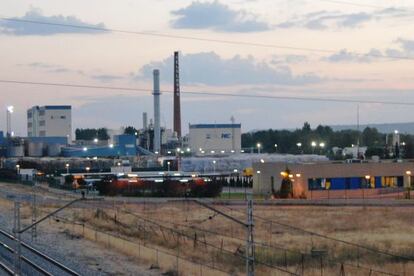The Spanish papermaker standing strong in the crisis
Europac has expanded abroad to offset weakness in domestic market and the energy sector reform

Spanish paper manufacturer Papeles y Cartones de Europa (Europac) is making a virtue out of necessity in the current crisis, taking its internationalization further by adding another plant in France and securing a foothold in Morocco to offset the negative impact of the government’s reform of the energy sector and the weakness of its domestic market.
The fruits of this are evident in the fact that the company increased its earnings fivefold in the first half of 2013 and its share price had risen 67 percent by the end of July from the start of the year.
Europac defines itself as a packaging multinational with a presence in all aspects of the sector, from forestry to waste management, Kraftliner paper, recycled paper, energy cardboard and boxes.
Chief Executive Enrique Isidro points out that the company’s performance during the crisis stands out for having eschewed layoffs and salary cuts as a means of reining in costs. The group has in fact acquired new companies and significantly increased its workforce from 351 in 2008 to 2,324 in 2013.
“The industry needs personnel with experience and knowledge; it’s a mistake to try to dispense with these,” Isidro says. “The workforce is what makes the company.” The executive says that when Europac listed in 2008 it unlocked new opportunities to grow and enhance its market position, despite the problems entailed by the crisis. It was also able to do so without undermining its financial strength and quality of service.
Europac increased its net profit in the first half of this year by 360 percent and its gross operating profit and sales by 20 percent. While its net financial debt in the period rose 2 percent to 301 million euros, the company is confident it can reduce it again over the coming months. After securing a refinancing deal with its credit banks, Europac does not face any major maturities until 2017 when it has to pay back 126.5 million euros.
Of all the company’s achievements in the first half of 2013, Isidro highlights an increase in sales in all of its lines of business, despite the crisis and a fall in the volatility of raw material and finished product prices from the levels seen in 2011, along with an improvement in its margin for Kraftliner.
As for its energy division, Europac points out that despite an increase in production in the first half, earnings have suffered as a result of the impact of the energy sector reform in Spain. The gross operating profit of this division in Spain fell 46 percent in the first half of 2013 due to the reform, partly offset by greater demand for steam as a result of higher output at its paper-manufacturing plants.
At the end of February, Europac estimated that the new 7 percent tax on sales of electricity to the network approved in December and other levies would cost it a net 5.5 million euros a year. On top of that, the company needed to fork out 3.5 million euros to buy carbon dioxide emission rights. Europac estimates that the latest reform could have a negative impact on annual sales of about 2.7 million euros.
Europac increased the price it charges for recycled paper by 50 euros a ton on August 1, taking advantage of the strength of its order book within a context of greater pressure on production costs. The company said it could not fully compensate the higher costs of energy with internal measures to enhance efficiency nor fully pass on those higher costs to the customer given the situation in the market.
The impact of the energy sector reform provides Europac with an additional reason to push ahead with its internationalization. Between 2000 and 2007, it acquired additional stakes in the Portuguese company Gescartao, marking its inaugural foray overseas, and establishing what has become one of the pillars of the group. In the first half, it also acquired a corrugated cardboard factory in France from DS Smith for 21.7 million euros.
It began producing in France in 2008 and is now the fourth largest supplier of packaging materials there. The operation will yield significant synergies with the industrial installations it has in Rouen.







































